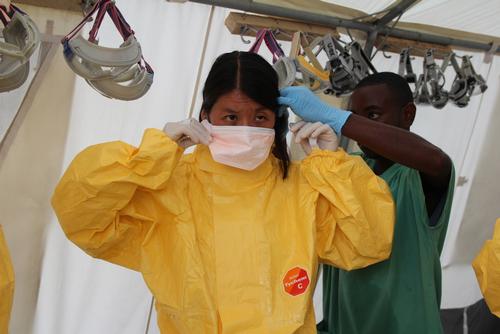This article first appeared in BMJ
Médecins Sans Frontières (MSF), the humanitarian medical charity, has been on the front lines of the Ebola epidemic since it began. It has had a major role in the international effort to control the outbreak, caring for two thirds of the 8000 people in Guinea, Sierra Leone, and Liberia who have been infected. But in early September, after six months of battling Ebola in vain, and with the death toll mounting exponentially, MSF effectively admitted defeat and said that it would take major military mobilisation by wealthy countries with biohazard expertise, not just international aid, to stop the disease. The charity had doubled its staff, MSF’s president, Joanne Liu, told the UN members, but it still was overwhelmed.
Liu, a Canadian paediatrician who has worked for MSF in war zones and natural disasters for the past 18 years, called upon UN members to dispatch their disaster response teams, backed by the full weight of your logistical capabilities. “Without this deployment, we will never get the epidemic under control,” she said.
Peter Piot, director of the London School of Tropical Medicine and Hygiene and the microbiologist who first identified the Ebola virus in 1976, also called in September for a “quasi military intervention.” He suggested that a major UN peacekeeping force should be deployed to Sierra Leone and Liberia, with huge donations of beds, ambulances, and trucks as well as an army of clinicians, doctors, and nurses.
The message came as the numbers of deaths from Ebola began to spiral, particularly in Liberia. There have been over 3800 reported deaths in the region, according to the latest World Health Organization figures, 40% of which have been recorded since September. WHO has estimated that there could be 20 000 infections before the outbreak is brought under control, and the US Centers for Disease Control has predicted that, in a worst case scenario, as many as 1.4 million may be infected by the end of January. As the economies and health infrastructures of the three countries,
home to over 22 million people, risk total collapse, the UN Security Council declared the outbreak was a threat to international peace and security.



